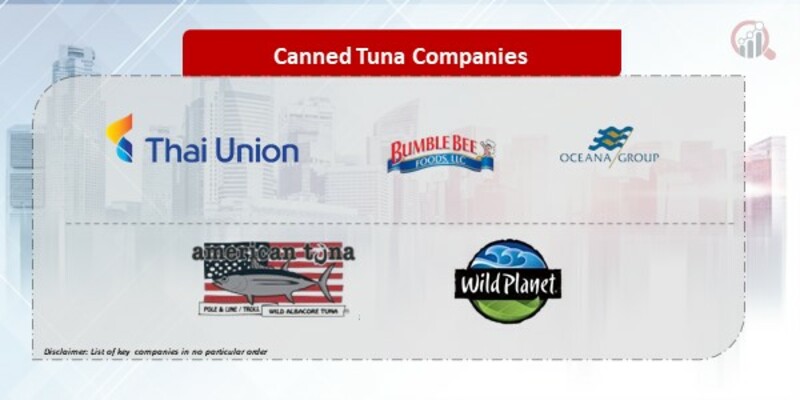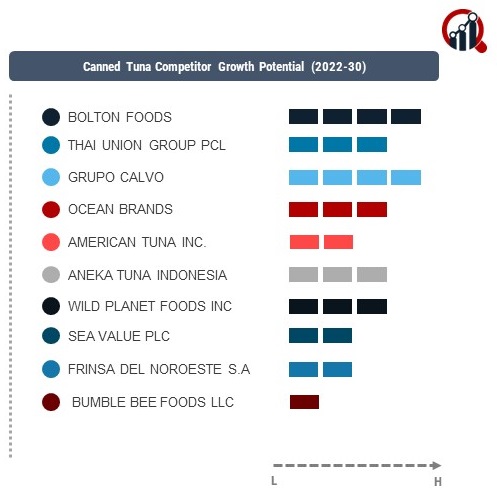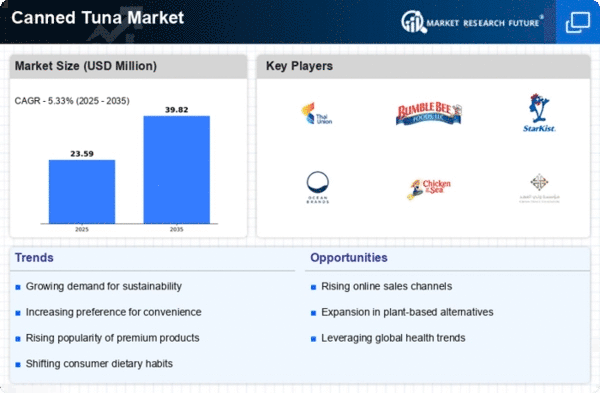Top Industry Leaders in the Canned Tuna Market

Strategies Adopted by Canned Tuna Key Players
The competitive landscape of the canned tuna market is shaped by a mix of established players and ongoing shifts in consumer preferences, sustainability concerns, and global market dynamics. To provide a comprehensive understanding of the competitive scenario in this sector, an analysis is required, including the strategies adopted, market share factors, news related to emerging companies, industry trends, current investment patterns, and the overall competitive landscape. Key players in the canned tuna market have strategically positioned themselves to navigate the challenges associated with overfishing concerns, changing consumer demands, and regulatory requirements.
Key Players:
Thai Union Group PCL (Thailand)
Bolton Foods (Italy)
Grupo Calvo (Spain)
Ocean Brands (Canada)
American Tuna Inc. (US)
Aneka Tuna Indonesia (Indonesia)
Wild Planet Foods Inc (US)
Sea Value PLC (Thailand)
Frinsa del Noroeste S.A. (Spain)
Bumble Bee Foods LLC (US)
The canned tuna market revolve around sustainability initiatives, product diversification, and brand positioning. Thai Union Group, for instance, has focused on sustainable fishing practices and certifications to address concerns related to overfishing and environmental impact. Bumble Bee Foods has adopted a strategy of product diversification, introducing various tuna products and leveraging its brand recognition to cater to different consumer preferences. StarKist Co. emphasizes brand positioning, marketing its products as convenient and high-quality options for consumers. Emerging companies like Wild Planet Foods differentiate themselves through a commitment to sustainable sourcing and transparent labeling.
Market Share Analysis:
The canned tuna sector involves evaluating factors such as brand strength, sustainability practices, product quality, and distribution capabilities. Established players like Thai Union Group and Bumble Bee Foods, with their strong brand recognition and global distribution networks, often command a significant market share. Emerging companies strive to gain market share by focusing on sustainable fishing practices, offering traceable sourcing information, and providing high-quality tuna products. Market share dynamics are also influenced by the ability to adapt to changing consumer preferences, maintain affordable pricing, and comply with evolving regulatory standards.
News & Emerging Companies:
The canned tuna market includes the emergence of new companies and strategic collaborations. Emerging companies such as Safe Catch and Wild Selections have gained attention by introducing innovative tuna products that prioritize sustainability and responsible fishing practices. Collaborations between canned tuna manufacturers and environmental organizations have become a notable trend, aiming to promote responsible fishing and conservation efforts. Additionally, news surrounding the development of novel packaging solutions, such as recyclable and eco-friendly materials, highlights the industry's response to consumer demands for environmentally conscious packaging.
Industry Trends:
The industry is currently witnessing investment trends focused on sustainable sourcing, technological advancements, and consumer education. Key players are investing in sustainable fishing practices and certifications, aligning with the growing consumer demand for ethically produced and environmentally friendly seafood. Investments in technological advancements include the adoption of traceability solutions, allowing consumers to track the journey of their canned tuna from ocean to shelf. Moreover, there is a trend towards investing in consumer education initiatives, providing information on responsible fishing practices, seafood certifications, and the nutritional benefits of canned tuna.
Competitive Scenario:
The canned tuna market is characterized by the industry's response to sustainability concerns, consumer demands for transparency, and the need to balance affordability with quality. Established players leverage their global reach, industry expertise, and commitment to sustainability to maintain market share. Emerging companies focus on innovation, responsible sourcing, and transparent communication to capture market segments that prioritize ethical and environmentally friendly products. The market is influenced by factors such as changing consumer preferences, sustainability considerations, and the importance of responsibly sourced seafood. As the canned tuna industry evolves, the demand for products that align with ethical and sustainable practices provides significant growth opportunities for both established and emerging players.
Recent Development
The canned tuna market was the collaboration between a major player and a technology firm to implement blockchain technology in the supply chain. This initiative aimed to enhance transparency and traceability, allowing consumers to verify the origin and sustainability of their canned tuna products. The use of blockchain technology was intended to address concerns related to illegal, unreported, and unregulated (IUU) fishing, providing a reliable and tamper-proof record of the entire supply chain process.
Furthermore, there was a notable industry-wide initiative promoting responsible sourcing and ethical labor practices. Key players collectively worked towards establishing industry standards for fair labor conditions in tuna fishing, addressing social responsibility concerns within the supply chain. This development reflected the industry's commitment to promoting not only environmental sustainability but also ethical and socially responsible practices. The competitive landscape in 2023 demonstrated a balance between established players adapting to sustainability standards and emerging companies driving innovation, resulting in a dynamic and competitive canned tuna market.












